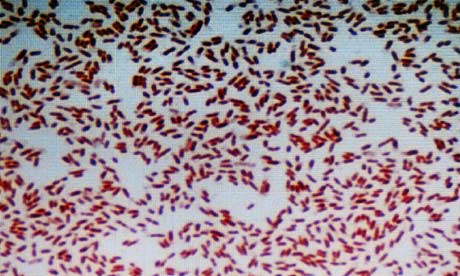E coli strain previously unseen and 'resistant to antibiotics'
Bacterial outbreak had spread beyond Germany to 10 countries with people infected through eating contaminated vegetables
- guardian.co.uk,
- Article history

Magnified E coli bacteria. Photograph: Rex Features
A strain of E coli spreading across Europe is a previously unseen and more virulent variant of the bacterium, health officials have said.
So far 18 people have died and more than 2,000 havehad become infected from eating contaminated vegetables. The bacterial outbreak had spread beyond Germany to 10 countries.
After scientists sequenced the genetic code of the E coli, Hilde Kruse, a food safety expert at the World Health Organisation told Associated Press: "This is a unique strain that has never been isolated from patients before … [there are] various characteristics that make it more virulent and toxin producing."
Scientists also said that the new strain appeared likely to be resistant to common antibiotics.
A spokesperson for the UK's Health Protection Agency said the organisation had not sequenced the bacterium but had agreed with the WHO finding that the E coli O104 strain associated with the outbreak "which we know to have a highly unusual combination of virulent properties, could be one that has never been seen before".
There is no evidence yet that the bacteria have appeared on British vegetables.
Stephen Smith, a clinical microbiologist at Trinity College, Dublin, said the new E coli strain was a "mongrel" combining two "nasty" types of the bacterium. He said: "It is very similar to enteroaggregative E coli which has been associated with outbreaks of watery diarrhoea, in developing nations since 1970. However, this bacterium has been recognised as a cause of diarrhoea in industrialised nations and has caused outbreaks in the US, Sweden, Britain and Germany."
The toxin produced by the bacterium binds to, and damages, kidney cells and leads to haemolytic uraemic syndrome (HUS), a rare and severe complication that destroys red blood cells and can affect the central nervous system. More than 500 cases of HUS have been reported in Germany and three cases were found in the UK in people who had recently been to Germany.
An HPA spokesperson said: "Bacteria and viruses are evolving all the time. We expect to see new strains, sometimes more virulent or resistant to antibiotics than others, and plan on that basis."
No comments:
Post a Comment